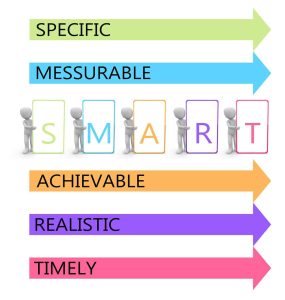SMART Goals. How To Set Smart Goals For Your Business
What is SMART Goals
Behind this acronym is a methodology that helps define goals and, most importantly, achieve them. That is, it helps to set goals that answer all kinds of questions, such as:
Your goals should be:

- What do I want to achieve?
- Who is involved?
- When should I do it?
- How much?
- When should I reach this goal?
- How can I measure my performance?
- How will I know if I achieved this goal?
Let’s look at each of the five components of S.M.A.R.T:
Specific
While setting specific goals sounds like a logical and simple step, most people do not.
To do something specific we need to answer the six questions: What, Who, Why, Where, When and Who.
Let’s look at a simple example of weight loss, you will notice that my goals of “getting in shape” and “losing weight” are not very specific goals. But to be more precise with my goal, I could say: “I want to be in shape. So my goal is to participate in the gym and train for one hour twice a week from next week “.
With the help of a simple sentence, I turned my general goal into a more specific one that I can easily stick to.
Measurable
It makes absolutely no sense to set goals if you do not know how to measure your achievement. Otherwise, how will you know that you have succeeded?
For our example, when it comes to weight loss, a seemingly clear indicator that can be used may be the body mass index (BMI). But BMI is a general indicator. does not tell the whole story. We know that muscle weighs more than fat – so measuring weight can be misleading. To get a better idea of my weight loss performance, I could measure my muscle mass and the size of my waist, thighs and arms over time.
To be a measurable goal, we must ask: How much; How many? How will I know when I achieved my goal;
Achievable
To be more effective, the goals we set must be achievable and realistic. However, they do not have to be “easy”. They should also give us the opportunity to expand by identifying new resources and actions that can help bring us closer to our goals. An achievable goal usually answers questions such as:
- How can I achieve this goal?
- How realistic is the goal, based on other constraints such as work, family responsibilities, logistics, budget?
Relevant
By taking this step we ensure that we set goals that are relevant to us and that align with our other goals. To be relevant, the answer to the following questions must be “yes”
- Does it seem worth it?
- Is this the right time?
- Does it complement the other efforts or needs?
In your professional life, you can add these two questions:
- Am I the right person to achieve this goal?
- Is it applicable in today’s socio-economic environment?
Asking and answering these questions helps us to avoid spending our finite time and energy on a goal that is simply not worth it. It’s all about making sure the timing is right.
Timebound
By adding deadlines to our goals, we can set priorities and milestones for measuring performance. It is important to set realistic timeframes to achieve the smaller goals that, together, help us achieve our ultimate goal.
Why are SMART Goals important for any business?
The most important thing is to recognize why you need to use S.M.A.R.T goals to run your business more successfully. SMART Goals is the methodology that can help you better manage your priorities, increase your focus and productivity and build your confidence.
As professionals, we are always looking for new opportunities to improve my performance, both in gaining and retaining clients. It is becoming very clear that marketing trends are changing rapidly. Not a day goes by without a new article or video appearing on social media: “The basics of marketing in 2022”, “The 10 things you need to do for successful marketing”, “I tried these new tactics and increased my traffic by 5 million Percent! ”
We always feel bad that we do not have enough time and resources to try everything we read. But then we take a step back and realize that realistically it is not possible to do everything effectively at once. Setting S.M.A.R.T goals helps me focus on the best ClickData activities and improve my statistics. When setting S.M.A.R.T goals, you are naturally directing your attention and your team’s attention to your next step. As a result, everyone can work more collaboratively and focus their efforts in the most effective direction and the actions that will follow will of course push you in that direction.
SMART Goals: examples of an effective marketing strategy
All too often, when companies want to start with integrated marketing, they go straight to the tools. Wondering: What are the right keywords to rank? Should we use Facebook, Twitter or Intagram? Do we have to write content four times a day or 57 times a month? Should we invest in this trade show or support it?
SEO, content, paid search and social effort are all essential elements to a successful marketing approach that avoids the pile. But they are just tools. Your efforts will be much more successful — and much easier to get started — if you start with goals and a KPI (key performance indicator).
Defining revenue targets and brand marketing goals early in your process will help you establish them as important elements of your marketing approach. This will affect the way your company approaches many aspects of the job, including content creation, SEO technician and on-demand campaigns. As a result, they help you find the shortest path to success.
SMART Goal: Brand Marketing
Setting brand marketing goals is critical to your success. Your company may want to set a specific brand goal to achieve a certain market share in your industry. Or you may decide to set smaller goals, such as expanding your email list by a certain percentage, or increasing your site and e-shop traffic, or earning Google quotes for a specific targeted keyword list.
SMART Goal: Revenue
Setting marketing goals for revenue helps you see how you will achieve them. For example, product-based companies may set a revenue marketing goal to increase sales or increase new customer contacts by a certain percentage. Service-based companies may set revenue targets to increase queries by a certain percentage. The goal becomes a benchmark for which you can monitor your progress.
In Future Marketing we are ready and willing to help you in the implementation and development of your online business and to contribute to the achievement of your SMART Goals.






